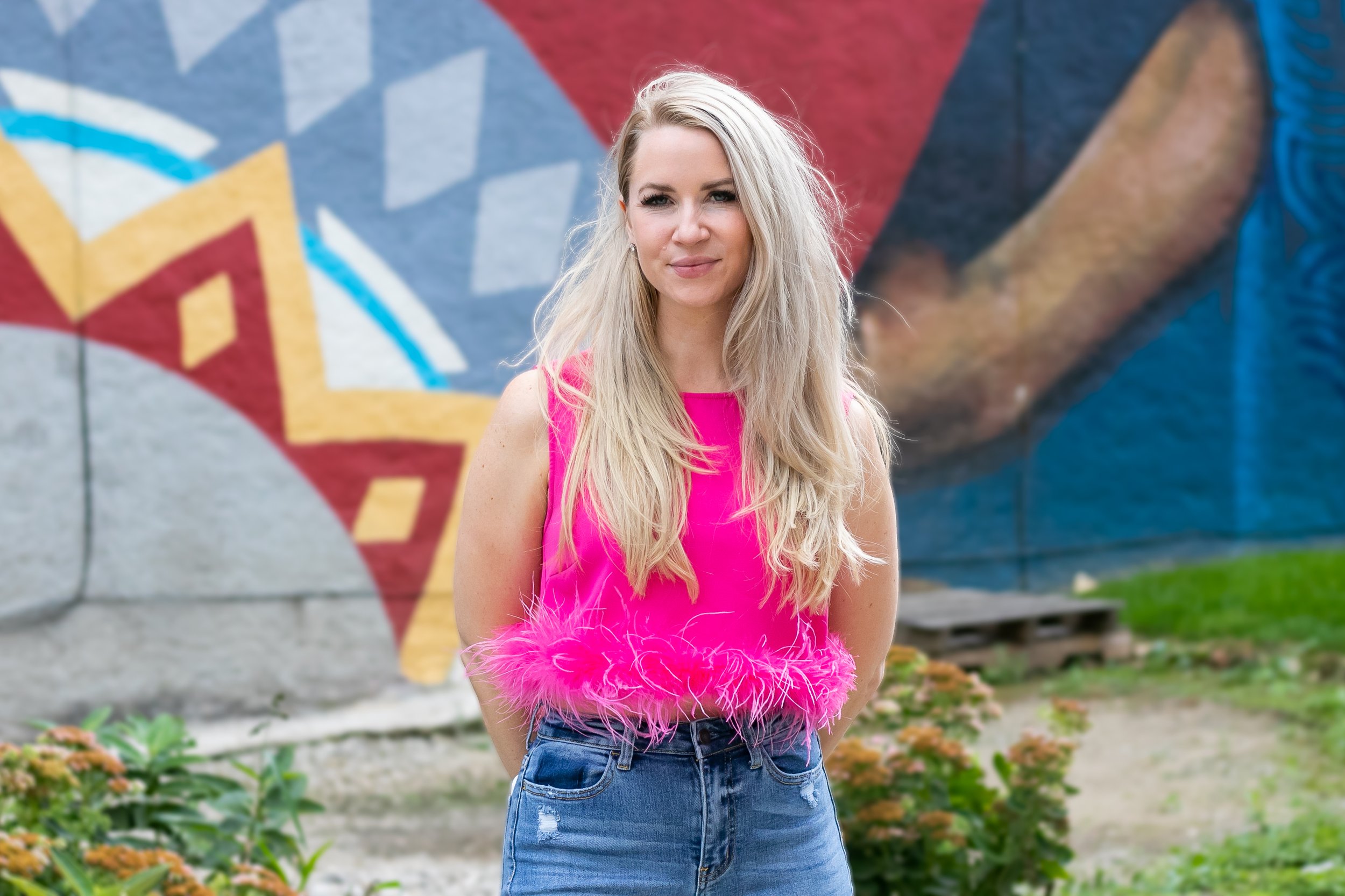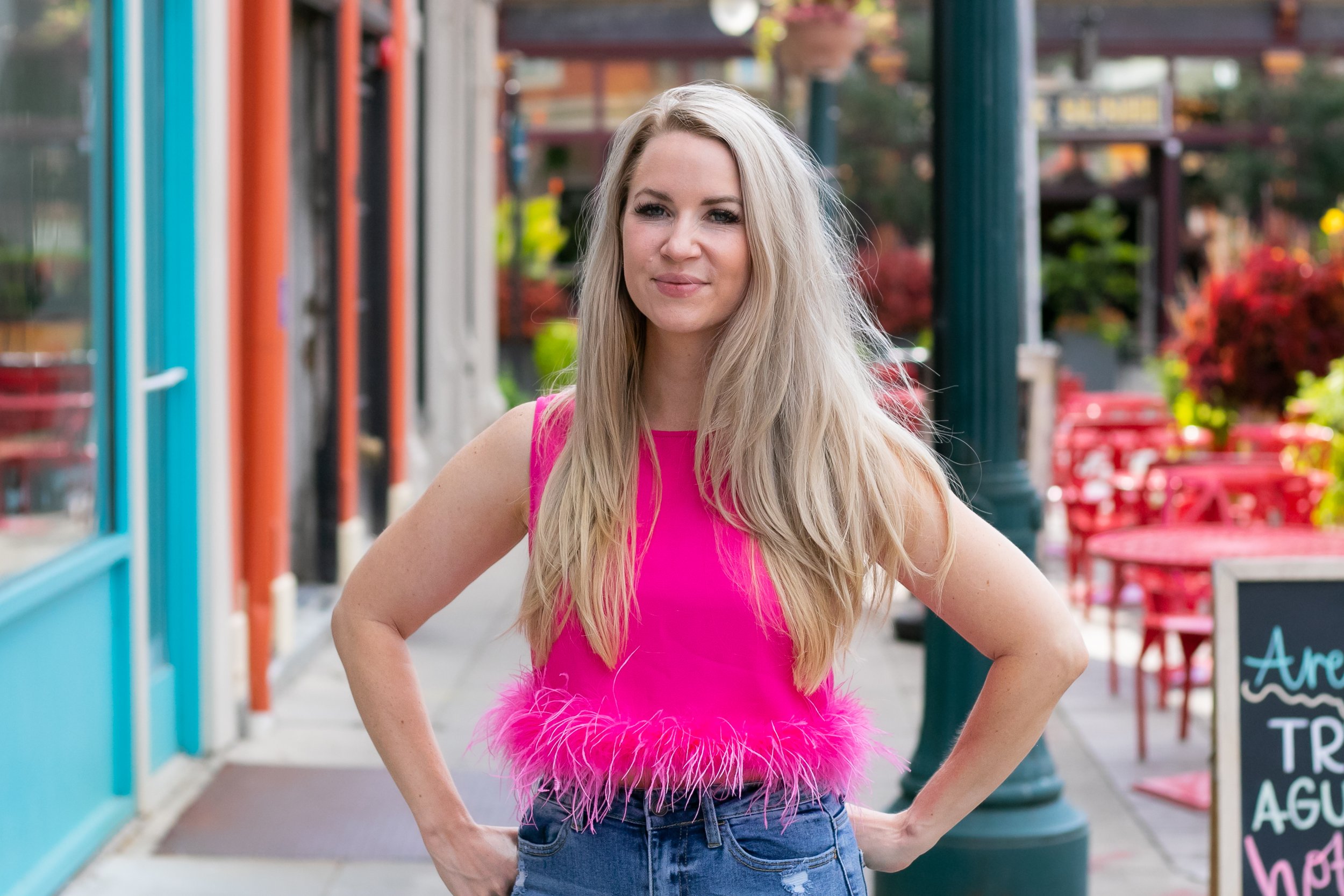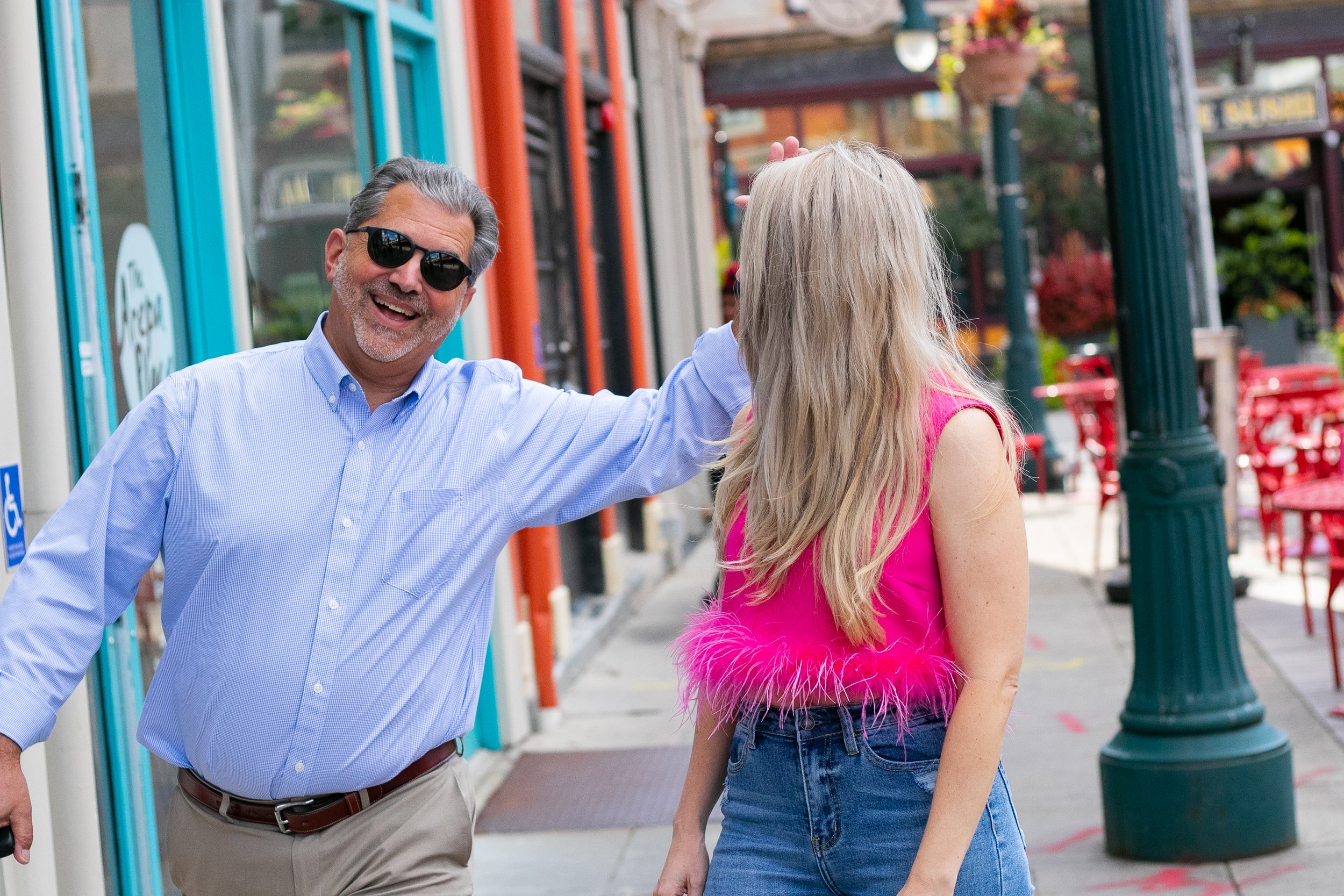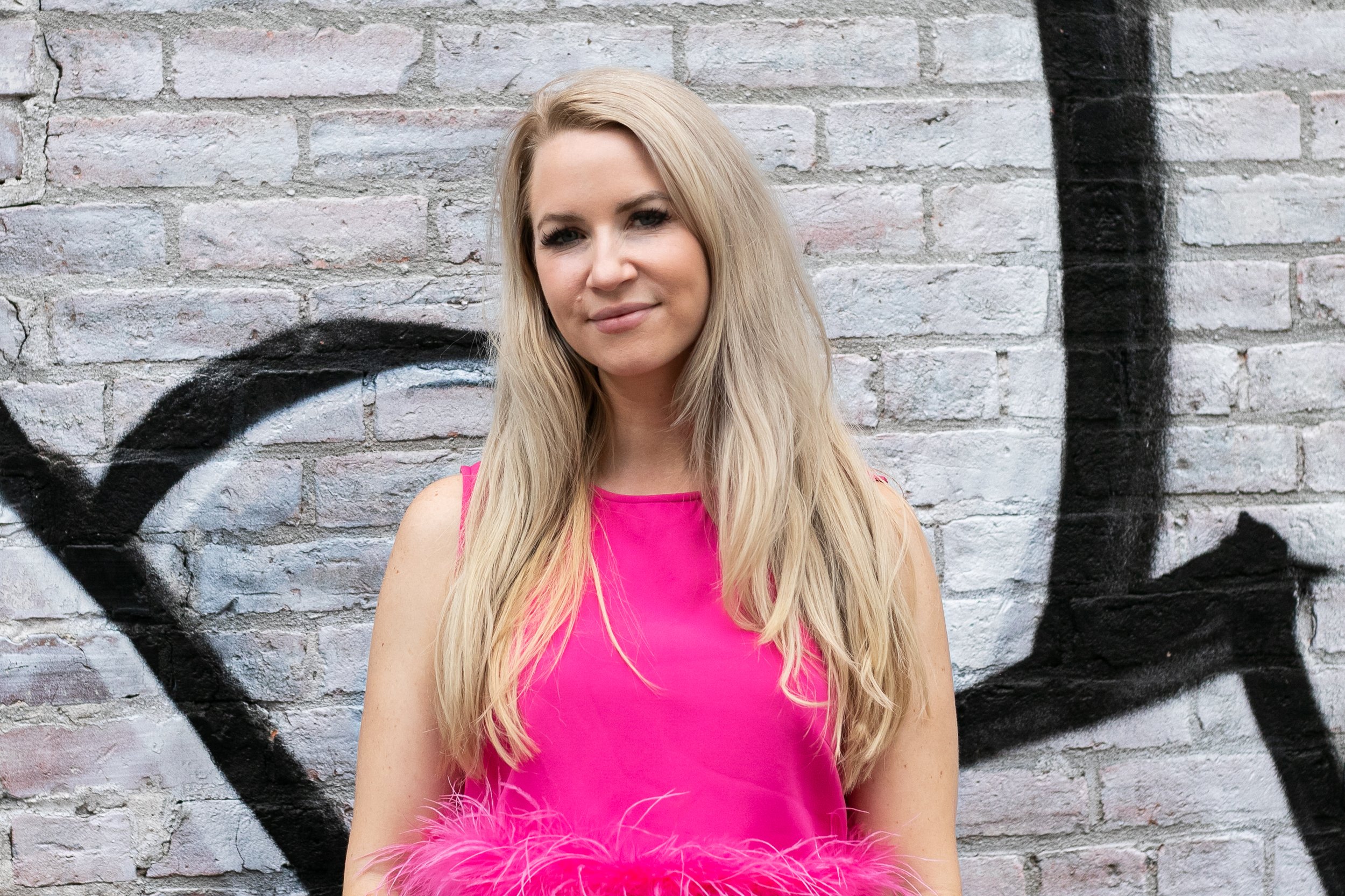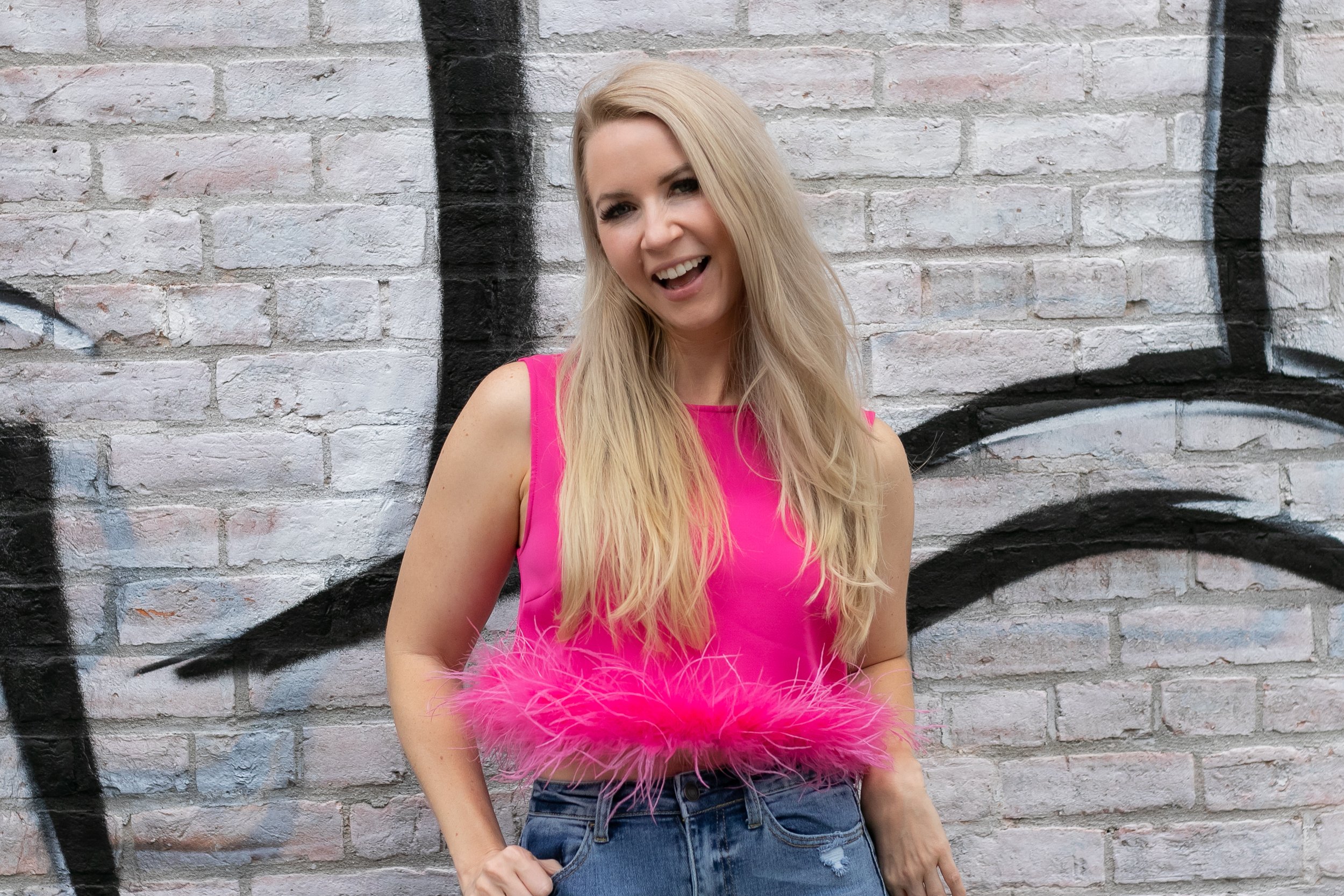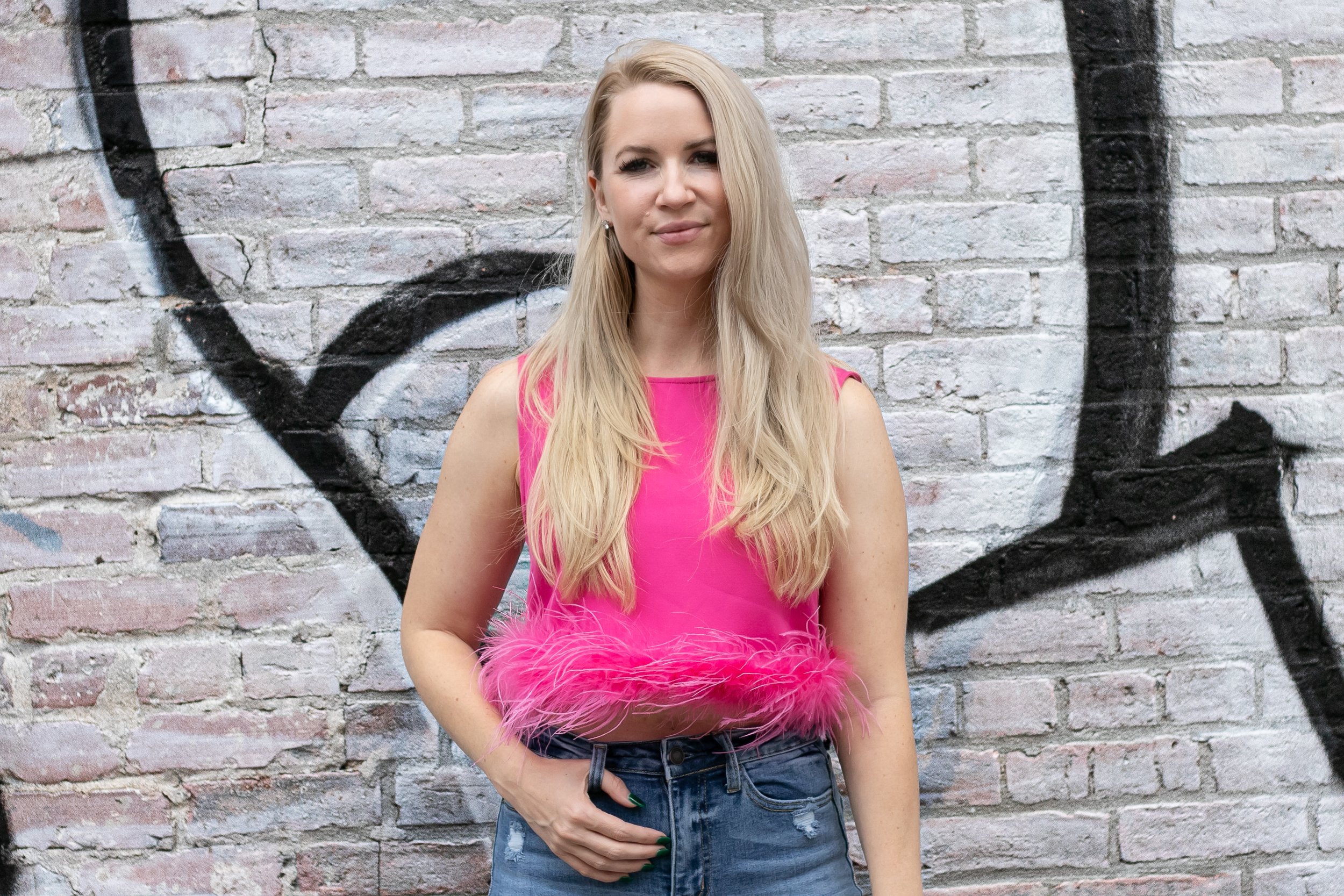A Chat with Cincinnati Comedy Queen Kelly Collette on Life and Covens
Talking to Kelly Collette is so easy. From the moment I met her, it felt like I’d known her as a friend for years. She is the person you spend a Friday night with on the couch with a glass of wine, talking until 3 a.m. She is a warm, comforting presence wrapped in a mischievous smile, and finished off with a joke.
Kelly has toured comedy clubs and performed on stages across the country. She has headlined festivals, worked with the Cincinnati Reds, and opened for sold-out crowds. We met on a sunny afternoon in the middle of a buzzing Findlay Market – grills were smoking meat while families ate at nearby tables. Our conversation – filled with laughs and jokes – spanned from Kelly’s earliest days of open mic nights to the moments she said, “Oh, I’ve made it.”
You can see Kelly perform live at Sam Adams Taproom on October 6 along with fellow comedians Karinne Turnbow, Gretchen Schultz, and Ossia Dwyer! All ticket proceeds go toward Women of Cincy.
Interview by Olivia Taylor. Photography by Chelsie Walter.
Tell us about where you grew up.
I've always lived in Cincinnati. I grew up in an area called Greenhills – very small like between two traffic lights. It was one of these utopian societies they were supposed to build during the Depression. They built three of them. And they were supposed to be a mix of independent agriculture and urban city life plus mixed genres of people from all economic backgrounds, and now it's just like a strip mall with a bowling alley and a bar.
Did you always have an inclination toward comedy?
As a kid, I was always using laughter as a defense mechanism – “If I make fun of me first before you can,” especially in school. I always got a huge adrenaline rush from making my friends laugh or the attention it brings. Even at soccer practice as a little girl, I would trip over the ball and do physical comedy. And then I would watch early stand-up – I watched Margaret Cho, Maria Bamford, and Sarah Silverman on Comedy Central in the 90s and early 2000s. And these women up there were great. Before that, I only had Gilda Radner, who was a sketch comedian, and I always watched her but seeing female stand-up and all the ideas coming out of her mouth, it was very inspiring.
I was like, “Oh, I'd love to try that one day. I think I'm good at that.” It wasn't until I graduated college that I was like, “Okay, I'm actually going to try it,” because up until that point, it's not a feasible profession – you don't get paid to do that. Or you have to win the lottery in terms of talent to make an artistic career work. So I never really had the gumption or the self-confidence to think it could be anything more than a pipe dream. I tried it and was like, “Oh man, this sucks. It really is gonna ruin my life because I want to do this every night for the next 10 years while I work a day job.”
Can you tell us how you broke into the comedy scene in Cincinnati?
We're really lucky that we have Go Bananas Comedy Club, which is an independent club and not a franchise. It's pretty much known across the country for harvesting alternative comedians who are really good. We have a very social community. We help each other, and we run jokes by each other. We have a Discord server.
The first time I ever went up on stage was in 2009. At Go Bananas, you bring five friends in order to get five minutes of stand-up time. I think I brought like 20 people. I was so scared that I had high heels on because I was like, “Oh, I’m going to look cute when I go up on stage.” But I grabbed one of my friends by the shirt, and I was like, “Give me your flip-flops,” and she's like, “What?” And I was like, “I'm gonna fall off the stage.” So I had to wear size five shoes on my size seven-and-a-half feet because I was so afraid that I would fall. After that, I think two or three comedians came up to me and said, “Good job,” and they told me to keep coming. I think that really helps.
Cincinnati is a very special place for comedy. We not only have shows in clubs, but a lot of independent venues, bars, and coffee shops will have shows. We will put a show anywhere. You don't have to spend a lot of money on a ticket to see good stand-up comedy. We have a lot of really great local talent.
How would you describe your comedy style?
I would say I'm a mix of observational with some storytelling and sprinkles of self-deprecation and cultural analysis. I try to relate to women as much as I can in my jokes because that's the point of view I see. I see all these things through my lens, so when I speak to them, it’s usually women who are like, “I relate to that because I also get invited to multi-level marketing parties,” or “I also have a niece that I can't impress.”
How do you write your material?
Sometimes I'll say something in conversation, and people will laugh, and I'll just immediately go into my notes app and be like, “Is this anything?” Another time, I'll do free writing, where I think of a topic and then try to write a paragraph about it. That usually never turns out to be anything good. The best writing comes when I'm either in the shower, in the car with the radio turned off like a psychopath, or right before I'm about to go to sleep. My mind is clear when I'm doing something else, taking a walk, or painting, and you just let your mind wander.
Do you have any advice for up-and-coming stand-ups in the Cincinnati scene about getting into the business?
I feel like an old person like this is my senior year platform. You grind for so long with people giving you advice, and then it suddenly switches, and you're just like, “Back in my day, we didn't do it like that.” So I love to tell people how hard it was for me and how much easier it is for them now. [Laughs] I would say be consistent with your material until you know you’ve got a solid five or 10 minutes that works. Try and practice as much as you can by going to open mics. Staying humble is a big one. Especially if people are throwing you shows and inviting you to do things, it’s important to remember that you're still really new. Don't shit-talk anyone – I think everybody makes that mistake during the first couple of years. Above all, just be funny.
What would you say is the Cincinnati comedy style?
That's a good question. I want to say there's a new thing where we do a lot of yelling. I don't know why – I don't know if it's because audiences have become a lot rowdier or that we feel we need to quiet them down with smart comebacks, but that seems to be a thing. I feel like we're very good at crowd work here. To anybody reading this: this does not give you any encouragement to yell things out on the stage and test us to see if we're on our toes. However, if someone does go on, I feel like Cincinnati's style is to very much comment on it – and then flip it real quick and then get back to your set.
Was there a moment or a big show when you thought, “I’ve made it.”?
I opened for Iliza Shlesinger a few times, especially when she came to the Taft, and that was super cool. Just being at the Taft and seeing it filled out and being the opening person, people are coming up to me, and people see me now, and they're like, “Oh, you are cool.” And filming my Dry Bar special out in Utah was really big because they flew me out, and I stayed on like the top of a mountain, and I'm like, this is pretty cool. I worked in Tacoma with Tim Meadows, which was really fun, but just being somewhere so far from Cincinnati, literally on the opposite side of the map, and now I get to put a little pin in the map and be like, I've been here.
When you start, you're like, “Okay, there's a six-hour radius with this gas money to justify the show.” When you start to get paid more than your travel, it's those “I have I made it” moments. Then when I headlined out there, I didn't think anybody knew who I was. Why would they come to a show of someone they hadn't seen? And it was really sweet. One girl posted a picture of her outfit on Instagram and said she was so excited to see Kelly Collette tonight, and it was someone I didn't know – it wasn't my mom! I was like, “Oh my God,” – someone is excited to see me and wants to tell the internet about it. That felt like a surreal moment. That's my one fan – shout out to her.
Do you have any other creative pursuits?
I paint – I just had an art show a little while ago. I like to write – I usually write for satirical sites like Ladyspike; I've written some stuff for Bust Magazine, which is fun. It's usually a comedic take on something, or it's something I care about. I think those are the big ones. Can't sing. Can't dance. Never gonna be a Rockette. I gotta settle. [Laughs]
What was the COVID shutdown like for you?
It was scary because I had a full calendar of dates, and all of a sudden, they were all gone. And so I was like, “Oh, God, what am I gonna do?” Even when you aren't performing, you don't want to be around anybody or share a microphone. People want to laugh still. So I started doing backyard comedy shows. I would host 40 people in my backyard. I said, “Please try not to drink so much because I don't want you to use my bathroom.” I would bring in local and national headliners when they were in town to visit their families. And I'd be like, play in my backyard and everybody B.Y.O.B., bring your own chair and spread out. It was nice. Then we did parking lot shows at Go Bananas, or you would just do Zoom shows, which are terrible because everybody turns their microphones off, and you're just telling jokes with no feedback. And then there are people typing, and they're all checking their Hinge profiles, completely mentally checked out.
How do you get over the nerves before going out on stage?
I think nerves actually help because it means you care about something. I'll just treat it like a blessing. I don't think you get over it; you just get through it. You get your confidence from being like, “Okay, that didn't kill me,” so I could probably do it again the next time I'm nervous.
With all the terrible stuff happening in the world, why is comedy still important?
What other choice do we have? You can laugh about it, or the other choice is much more grim. All the stuff going on, it’s a collective experience. You can be so depressed inside your head being, “Why is this happening to me at this point in my life,” and then you can hear a joke, and you realize, “Oh, it's happening to everybody,” – this person is having this shared experience, and that's how they're getting through. You're actually doing a very good service, making people laugh in troubled times. It makes people feel less alone.
Who are the women in your life who inspire you?
Maria Bamford is a huge one, and I got to work with her last month in Louisville. She's the nicest comedian ever – she tipped me the same pay the club paid me. She's so transparent and kind and thoughtful, and she wants women to tour with her.
I have this group of girls, and I call them “My coven.” The light shines in their eyes for me. I love rooting for them, and they work so hard to root back for me. I text them, “Hey, I'm about to do this thing,” and it’s like emojis off the charts and “I'm proud of you,” and they make me feel like what I'm doing is special, which I think is what you need as a creative person. You need people to be your cheerleader because it's so hard
Women of Cincy is a certified 501(c)3. This belongs to you. Consider supporting future stories with a donation.
Do you know an awesome Cincinnatian? Nominate them here! New features launch on Mondays.

